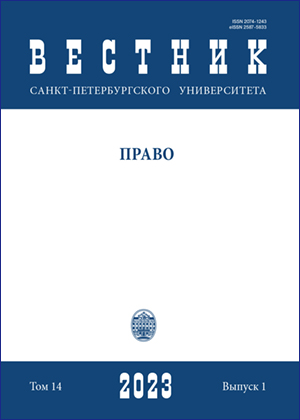Experimental legal regime – a testing ground for innovation and regulation
DOI:
https://doi.org/10.21638/spbu14.2023.103Abstract
The focus of this article is a critical analysis of the regulatory window of the experimental legal regime in the field of digital innovation. Its distinctive features are distinguished: its secondary nature in relation to the basic legal regulation, its ordinariness, its voluntary extension to business entities, its expansive or neutral influence on the scope of their legal capacity, its certainty in terms of time and the circle of persons. It is noted that the implementation of the experimental legal regime in the direction of the financial market has certain features, which is manifested in the possibility of establishing additional conditions for the experimental legal regime, separating its secondary regulatory window, giving the Bank of Russia the functions of an authorized body, etc. Next, the mechanism for establishing an experimental legal regime is outlined, in which five consecutive stages are distinguished: the introduction of an initiative proposal to the Ministry of Economic Development (or the Bank of Russia); consideration of the initiative proposal by the authorized body with the participation of the business community, branch ministries and the highest authority of the subject of the Russian Federation (optional); the establishment of an experimental legal regime by the Government of the Russian Federation; implementation and monitoring of the experimental legal regime, as well as evaluation of its effectiveness and efficiency. In conclusion, the norms of the experimental legal regime, potentially tending to corruption-causing factors, are identified and ways to improve legislation are proposed.
Keywords:
experimental legal regime, digital innovations, regulatory sandbox, corruption-causing factors, Bank of Russia
Downloads
References
Downloads
Published
How to Cite
Issue
Section
License
Articles of "Vestnik of Saint Petersburg University. Law" are open access distributed under the terms of the License Agreement with Saint Petersburg State University, which permits to the authors unrestricted distribution and self-archiving free of charge.






